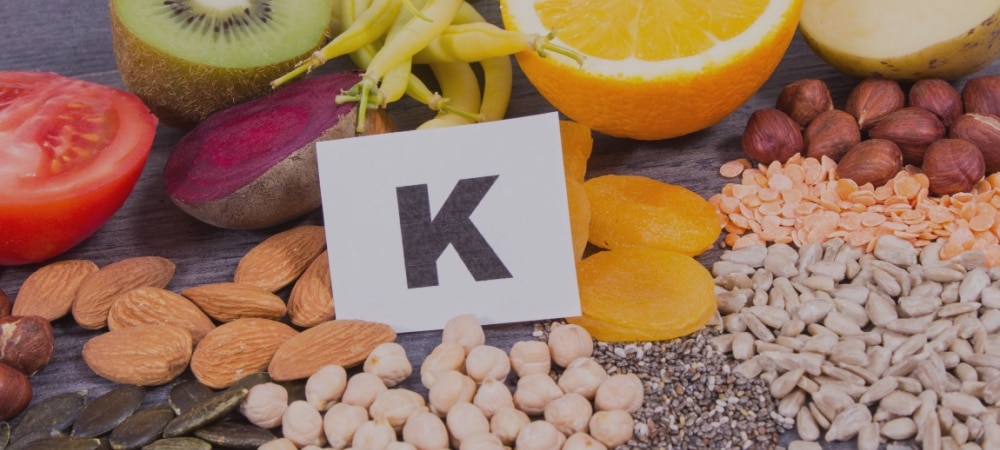Potassium is an important mineral that plays a role in many metabolic activities from regulating blood pressure to maintaining bone health. This mineral, which is also a kind of electrolyte, is also involved in the transmission of electrical impulses in the body and in maintaining fluid-electrolyte balance. Like other minerals, potassium is not synthesized in the human body and must be taken into the body from outside through food. Symptoms such as fatigue, muscle cramps and heart rhythm disturbances can occur when there is insufficient intake through food or when there is a problem affecting mineral absorption in the body.
What is Potassium?
Potassium is a mineral involved in many metabolic activities such as the proper functioning of nerves, muscles and the heart, and the transportation of nutrients and waste between cells. Minerals are inorganic elements that occur naturally in nature but cannot be produced in the human body. This is why people need to get minerals from food and/or dietary supplements.
Potassium is involved in various metabolic processes in the body, but its main role is to maintain the fluid balance in the cells, to transmit electrical impulses throughout the body, and to ensure the proper functioning of the cells. It is therefore also known as a type of electrolyte.
Absorption of dietary potassium occurs largely in the small intestine. After ingestion, about 90% is used by the body. The rest is excreted through urine, feces or sweat. The kidneys help maintain potassium balance by adjusting the amount excreted according to changes in daily intake.
What are the Benefits of Potassium?
About 98% of the potassium in the body is found inside cells. Of this, 80% is found in muscle cells and the rest in liver, bone and red blood cells. After entering the body, potassium acts as a kind of electrolyte (substances that decompose into electrically charged ions when dissolved in water) and takes part in important processes such as maintaining fluid balance, ensuring communication between nerves and regulating muscle contractions. Accordingly, the main potassium benefits are as follows:
- Helps regulate fluid balance: It is known that about 60% of the body consists of water, of which about 40% is found in the intracellular fluid. The remaining amount of water is found in the extracellular fluid. The minerals sodium and potassium play an important role in maintaining intracellular and extracellular fluid balance. While potassium is the main electrolyte in the intracellular fluid, sodium is the main electrolyte in the extracellular fluid. For a healthy life, the amount of electrolytes inside and outside the cell must be equal. Otherwise, cells may be damaged and various health problems such as kidney, liver and heart diseases may occur. For this reason, it is important to take care to take enough minerals to maintain the fluid-electrolyte balance.
- Plays a role in nerve conduction: Many functions in the body, such as muscle contractions, reflexes, heartbeat and kidney functioning, are carried out by the nervous system, which transmits messages between the brain and other parts of the body. Nerves are stimulated as sodium ions move into the cell and potassium ions move out of the cell, that is, as the ions move. Therefore, low potassium can cause impaired communication between nerves.
- It is involved in the regulation ofblood pressure: High sodium can cause an increase in blood pressure, i.e. high blood pressure. The mineral potassium plays an important role in the body’s removal of excess sodium and thus in the regulation of blood pressure. For this reason, experts recommend reducing sodium intake while increasing potassium intake to reduce the risk of serious health problems such as heart attack and stroke by lowering blood pressure.
- Helps maintain kidney health: It may help prevent kidney stone formation by supporting the reabsorption of calcium in the kidneys.
- May help eliminate edema: Edema is a problem that occurs as a result of retaining more fluid in the body than it should be. Some research suggests that this mineral may help remove excess fluid from the body by increasing urine production and lowering sodium levels.
In addition, according to some experts, potassium may also play a role in maintaining bone health.
What Causes High Potassium?
Potassium is one of the essential minerals for the body, but its deficiency as well as its elevation can cause various health problems. High potassium in the blood, also known as hyperkalemia, can manifest itself with symptoms such as heart palpitations, shortness of breath and fatigue. Under normal conditions, excess amount can be excreted from the body through urine in people who do not have any impairment in kidney function. However, even low doses of this mineral can cause hyperkalemia in people with chronic renal failure or who use diuretic drugs. In addition, health problems such as type 1 diabetes, congestive heart failure, adrenal insufficiency or liver disease can also lead to hyperkalemia. Accordingly, the main causes of high potassium are as follows:
- Chronic kidney disease,
- Especially kidney patients consume too much potassium-containing foods and beverages,
- Some antibiotics and blood pressure medicines,
- Use of potassium supplements without a doctor’s recommendation,
- Addison’s disease, characterized by the body not producing enough aldosterone, a type of hormone that helps manage potassium levels,
- Uncontrolled diabetes (diabetes),
- Serious burns or injuries.
Symptoms may be more severe if hyperkalemia occurs suddenly for a reason such as kidney disease. The main symptoms of high potassium are as follows:
- Heart palpitations
- Arrhythmia(irregular heart rhythm),
- Shortness of breath
- Chest pain
- Heart attack
- Nausea or vomiting
Since sudden onset of hyperkalemia can lead to serious complications, it is important to consult a healthcare provider immediately and have the necessary controls performed.
What Causes Low Potassium?
Potassium deficiency, also known as hypokalemia, is when blood potassium levels are lower than they should be. People who eat a diet low in potassium-containing foods may be at higher risk of health problems such as high blood pressure, edema and kidney stones. However, hypokalemia, a serum level of less than about 3.6 mmol/L, is rarely caused by inadequate dietary mineral intake. Most often, health problems such as diarrhea and vomiting can cause deficiency by affecting mineral absorption in the body and increasing excretion. Possible reasons for the shortfall can be listed as follows:
- Chronic kidney diseases,
- Use of drugs known as diuretics,
- Eating disorders such as bulimia and anorexia,
- High aldosterone levels or adrenal gland disorders such as Cushing’s syndrome,
- Use of laxatives,
- Excessive sweating,
- Excessive alcohol use,
- Genetic disorders such as Bartter syndrome or Gitelman syndrome,
- Magnesium deficiency.
In most patients, a deficiency of this mineral does not cause any symptoms or may manifest itself with mild symptoms such as heart palpitations, shortness of breath, fatigue, tingling sensations in various parts of the body. However, if the deficiency occurs suddenly and the level of the mineral in the blood drops below about 2.5 mmol/L, serious complications can occur. Accordingly, the symptoms of potassium deficiency are as follows:
- Abnormal heart rhythms, especially in people with pre-existing heart disease,
- Muscle twitching and cramps,
- Low blood pressure(low blood pressure),
- Dizziness or fainting,
- Encephalopathy (a type of brain damage) in patients with kidney disease.
Since potassium deficiency diseases can cause serious consequences, it is important to seek help from a specialist doctor if you notice the symptoms listed.
What is the Normal Value of Potassium?
Normally, the normal value of potassium in healthy people varies between 3.6 and 5.0 mmol/L. According to experts, taking about 400-800 mg of K mineral per day is sufficient to maintain normal values as long as there are no health problems. Knowing about foods high in potassium and including them in the diet can help maintain normal values. Apricots and cooked lentils are among the foods that contain the most potassium. These two important nutrients can provide about 16% of the daily requirement. In addition, vegetables and fruits such as pumpkin, potatoes, bananas and spinach are rich in this valuable mineral.
Frequently Asked Questions
What Drops Potassium Fastest?
Limiting dietary intake and taking medications recommended by a doctor to prevent the body from retaining too much potassium can help hyperkalemia.
What Causes Potassium Deficiency in the Body?
In case of deficiency, symptoms such as low blood pressure, arrhythmia, dizziness, fainting, weakness in muscles may occur.
Does Potassium Regulate Heart Rhythm?
Potassium can regulate heart rhythm by helping to control the electrical signals of the myocardium, the middle layer of the heart muscle.
What Foods Lower Potassium?
No food found in nature can directly lower potassium. However, fruits and vegetables such as apples, strawberries, blueberries, pineapple, carrots, peas, beans, asparagus and onions can help control symptoms.
Does Drinking Lots of Water Lower Potassium?
Drinking plenty of water can increase potassium excretion from the body in urine and sweat. However, experts say this is not the right way to go, as drinking plenty of water can also increase the excretion of other vitamins and minerals in the body.
What Does Potassium Do in the Body?
Potassium is involved in many metabolic activities such as maintaining fluid balance, nerve conduction, regulating heart rhythm, and controlling muscle contraction.
What to Do for Low Potassium?
First, it is important to determine the cause of the deficiency. If the cause is inadequate dietary potassium intake, including foods such as lentils, apricots, potatoes and bananas in the diet can help to eliminate the deficiency. In some cases, experts may also recommend the use of food supplements.
Potassium deficiency or excess can lead to serious health problems. If you have been experiencing symptoms such as fatigue, muscle cramps, heart rhythm disturbances or shortness of breath in recent days, you can make an appointment with our specialist doctors immediately.
Make an Appointment Now


